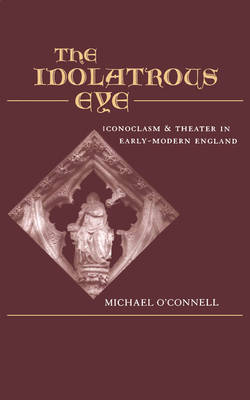
Je cadeautjes zeker op tijd in huis hebben voor de feestdagen? Kom langs in onze winkels en vind het perfecte geschenk!
- Afhalen na 1 uur in een winkel met voorraad
- Gratis thuislevering in België vanaf € 30
- Ruim aanbod met 7 miljoen producten
Je cadeautjes zeker op tijd in huis hebben voor de feestdagen? Kom langs in onze winkels en vind het perfecte geschenk!
- Afhalen na 1 uur in een winkel met voorraad
- Gratis thuislevering in België vanaf € 30
- Ruim aanbod met 7 miljoen producten
Zoeken
The Idolatrous Eye
Iconoclasm and Theater in Early Modern England
Michael O'Connell
Hardcover | Engels
€ 373,45
+ 746 punten
Omschrijving
This study argues that the century after the Reformation saw a crisis in the way that Europeans expressed their religious experience. Focusing specifically on how this crisis affected the drama of England, O'Connell shows that Reformation culture was preoccupied with idolatry and that the theater was frequently attacked as idolatrous. This anti-theatricalism notably targeted the traditional cycles of mystery plays--a type of vernacular, popular biblical theater that from a modern perspective would seem ideally suited to advance the Reformation project. The Idolatrous Eye provides a wide perspective on iconoclasm in the sixteenth century, and in so doing, helps us to understand why this biblical theater was found transgressive and what this meant for the secular theater that followed.
Specificaties
Betrokkenen
- Auteur(s):
- Uitgeverij:
Inhoud
- Aantal bladzijden:
- 208
- Taal:
- Engels
Eigenschappen
- Productcode (EAN):
- 9780195132052
- Verschijningsdatum:
- 13/01/2000
- Uitvoering:
- Hardcover
- Formaat:
- Genaaid
- Afmetingen:
- 162 mm x 238 mm
- Gewicht:
- 521 g

Alleen bij Standaard Boekhandel
+ 746 punten op je klantenkaart van Standaard Boekhandel
Beoordelingen
We publiceren alleen reviews die voldoen aan de voorwaarden voor reviews. Bekijk onze voorwaarden voor reviews.









